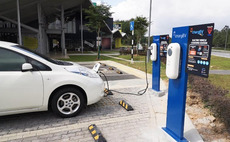
Q2 analysis: Private equity goes public
Second-quarter analysis: Low public market valuations create investment opportunities; China fundraising slows; private equity firms perform cornerstone role in Asia IPOs.
1) Weak public markets present opportunities
TPG Capital last week shook up the management at beleaguered Chinese sportswear retailer Li Ning. In came Jin-goon Kim, a TPG partner who previously helped turn around women's shoe chain Daphne as executive vice chairman, and out went CEO Zhiyong Zhang.
When TPG invested in Li Ning in January, subscribing to RMB750 million ($119 million) in convertible bonds alongside Government of Singapore Investment Corp. (GIC), the PE firm was expected to bring all its restructuring skills to the fore. Li Ning is trading at its lowest level in six years on the back of poor business performance and Kim has warned that a turnaround will take time.
TPG is betting that the long-term prospects for Li Ning - which has pursued too many commercial dead ends, but remains an iconic brand in a growing consumer market - outweigh more immediate concerns reflected in its depressed stock price. This has become a popular investment thesis of late.
The Hang Seng Index is down more than 13% on a one-year basis, but the second quarter of 2012 has proved particularly tumultuous. After a reasonably stable April, the index plunged 12.5% in May as euro zone concerns filtered into other markets. The index ended the quarter at 19,441 points, down 5.4% from where it started. Other major global indices saw similar contagion in May.
It is no coincidence that private equity firms are now talking up China PIPE deals. Some are even acting on them, taking significant minority stakes - usually with board seats and agreed business development plans - in companies trading in Hong Kong and the US. In most cases, the firms had been tracked for some time; it was just a case of finding the right time to act.
Between April and June, KKR invested $65 million into China Cord Blood, a New York Stock Exchange-listed blood banker; TPG invested $60 in China Ruifeng Galaxy Renewable Energy, a Hong Kong-listed wind turbine and power grid specialist; CITIC Capital invested $29.9 million in China Tianyi Holdings, a Hong Kong-listed orange producer; and CVC Asia Pacific led a $94.4 million investment in C.Banner International, a Hong Kong-listed women's footwear retailer.
A number of industry participants argue that public deals make sense in China right now because valuations for private deals are still too high. The Asia investment statistics make for interesting reading in this context.
Private equity firms committed a total of $15.1 billion in the second quarter, up from a more than two-year low of $11.1 billion for the previous three months. However, more than one third of the total came from buyout transactions. Growth deals, meanwhile, fell by half quarter-on-quarter to $2.3 billion. Transaction volume slumped by a similar margin.
This can be blamed to a degree on the widening gulf between steep private valuations in China and the timeliness and size of returns available via IPOs. Private equity investment in the country came to $4.1 billion across 82 deals for the second quarter of 2012. For the comparable period in 2011, whenprospects looked rosier, $9.6 billion was committed in 204 deals.
Completing the circle, PIPE deals in the second quarter of 2012 came to $4.5 billion, nearly twice the growth capital total. Although large-scale public deals have a habit of distorting the data - typically involving Temasek Holdings and Chinese banks - the trend seems valid. PE investors are, as ever, putting money where they see value.
2) China fundraising is slowing down
Both KKR and TPG are approaching first closes on their latest Asian funds - the former has already accumulated $3 billion towards a final target of $6 billion, while the latter is reportedly around the $1.5 billion mark on its $4-5 billion vehicle. Sources tell AVCJ that Bain Capital and PAG Capital are even nearer the finish line. Bain is on $2.3 billion, a couple of hundred million short of its hard cap, while PAG has more or less reached its $2.5 billion target.
This potentially sizable addition to Asian private equity fundraising statistics would be much welcomed. The regional total for the second quarter of 2012 was a paltry $8.4 billion, the lowest level seen since 2009.
While LPs globally are seeking to maintain or increase their Asian exposure - compared to reductions for European and US allocations - fundraising remains a challenge.
China is the exception and the country has been propping up Asia for quite some time, first with US dollar-denominated funds and then with renminbi vehicles.
In the first half of 2011, China accounted for 62% of fundraising, and the renminbi share was 33%. In the second half of the year, the China and renminbi shares increased to 71% and 57%, respectively. For January-June 2012, 79% of private equity capital raised in Asia entered China-focused funds. The renminbi share was 65%.
The problem is that China fundraising is now waning. A total of 26 vehicles attracted capital in the second quarter of 2012 compared to 19 in the previous three months, but the amount attracted was just $6.3 billion, down 45%.
The US dollar segment was hit particularly hard, but then there was no Hony Capital Fund V contributing $2.4 billion on its own. The renminbi segment also weakened, which only serves to emphasize the role played by large state-backed vehicles. In the first quarter of the year, Nanjing Jianning Zijin Investment Fund Management achieved a final close of $3.2 billion, more than 25% of the China total. The largest vehicle for April-June was Zhongchen New Energy Fund on $1.6 billion.
Elsewhere in the region, 17 funds attracted a total of $2 billion in commitments in the first quarter of 2012, down from $2.5 billion for 13 vehicles during the previous three months.
Three funds were responsible for more than three quarters of the capital and each was oversubscribed - Saratoga Asia III at $600 million, ChrysCapital VI at $510 million and CHAMP Ventures Investments Trust No.7 at $483 million. This is the flight to quality that one would expect in the current environment: three well-regarded managers with track records are able to raise money while others struggle.
3) PE firms take cornerstone positions in IPOs
The Bursa Malaysia has become Asia's star performer. While IPOs globally are being cut back or abandoned, Kuala Lumpur remains resilient. China is the most active market for listings in the region, accounting for the majority of the 37 private equity-backed listings during the second quarter of 2012, including nine of the top 10, but Malaysia-listed Felda Global Ventures Holdings was by some distance the leader, raising $3.1 billion. IHH Global Healthcare, a unit of Khazanah Nasional, is likely to extend the bourse's run, eying a $2 billion offering.
Analysts say the deal pipeline can't be sustained, and they are probably right. It might not have lasted as long as it has without significant participation from cornerstone investors, including a few private equity firms, in these IPOs.
About one third of Felda's offering was covered by cornerstones including AIA Group, Employees Provident Fund of Malaysia, FIL Investment Management, Qatar Holding and Value Partners. More than 60% of IHH's shares are likely to be picked up by backers such as Blackrock, Capital Group, Och-Ziff Capital Management and Government of Singapore Investment Corp. (GIC).
Two more of the 10 largest transactions completed in the second quarter of 2012 were cornerstone investments. RRJ Capital and Temasek Holdings accounted for about half of Kunlun Energy's $1.3 billion IPO, while D.E. Shaw, PAG Capital, Oman Investment Fund and SBI Holdings picked up about one quarter of Haitong Securities' $1.7 billion Hong Kong offering.
Private equity firms are a far more conspicuous presence in these deals than was previously the case. Opportunities have arisen because many institutional investors have responded to global volatility by scaling back their commitment to equities.
PE firms, however, can afford to take a longer term view - although it's unclear how such deals fit into the operational value-add remit that so many industry participants now trumpet. On the plus side, entry prices might be set at a level that doesn't fully reflect companies' prospects in order to attract investors at a time when sentiment is weak. This affords the possibility of a reasonably swift exit via the public market.
Latest News
Asian GPs slow implementation of ESG policies - survey
Asia-based private equity firms are assigning more dedicated resources to environment, social, and governance (ESG) programmes, but policy changes have slowed in the past 12 months, in part due to concerns raised internally and by LPs, according to a...
Singapore fintech start-up LXA gets $10m seed round
New Enterprise Associates (NEA) has led a USD 10m seed round for Singapore’s LXA, a financial technology start-up launched by a former Asia senior executive at The Blackstone Group.
India's InCred announces $60m round, claims unicorn status
Indian non-bank lender InCred Financial Services said it has received INR 5bn (USD 60m) at a valuation of at least USD 1bn from unnamed investors including “a global private equity fund.”
Insight leads $50m round for Australia's Roller
Insight Partners has led a USD 50m round for Australia’s Roller, a venue management software provider specializing in family fun parks.







